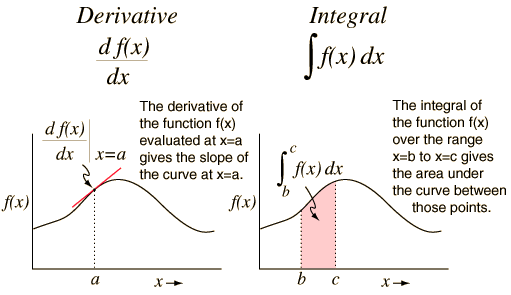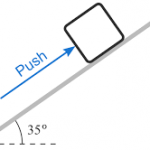Calc 1 and Calc 2 are two essential math classes all engineers are required to take on their road to a degree. In this article, you will learn about the content of Calculus 1 and 2, similarities and differences, which class is harder, and frequently asked questions.
Differences
To better understand what makes each class unique, it is best to start with the differences between the two classes. There is one overlying distinction: Calc 1 is Integral Calculus, while Calc 2 is Differential Calculus.
What is Differential Calculus?
Differential calculus is a branch of calculus focusing on finding out the rate of change between one variable and another variable. In simpler terms, differential calculus is the process of using derivatives to find slopes. Slope, you say? Yes, that thing you were learning in 8th grade using rise over run is the foundation of calculus. Hopefully, that makes you feel a little better about what’s to come in this class.
The start of Calc 1 is fairly elementary, as you will find yourself drawing lines and learning about limits. You will find yourself taking 5 minutes to solve a problem because you have to keep writing new limits, but it gets better, I promise. Eventually, you’ll learn some new shortcuts with the power and chain rules. At this point you will be thinking to yourself: why in the world was I ever taking limits? All in all, differential calculus is simply learning how to calculate derivatives and interpreting them in ways that are applicable to real-life problems.

What is Integral Calculus?
Integral calculus is a branch of calculus focusing on finding area, volume, and displacement functions by combining infinitesimal (very small) data. In simpler terms, a lot of integral calculus is finding the area under the curve of a function graph. This can be as easy as using A=B*H to find the area of a rectangle, or A=(B * H)/ 2 to find the area of a triangle. It’s crazy to see how simple calculus may be incredibly useful at times especially later on in more Physics-based courses.
Like Calc 1, you will start off learning very basic math. You will literally find yourself using the equations up above for finding the area of rectangles and triangles. However, it can get pretty tough very quickly if you don’t pay close attention. You will go from simply finding the area of 2D shape, to all of a sudden looking at 3D space and finding volume. You will learn a variety of different strategies such as u-substitution, integration by parts, trigonometric identities, and more to help simplify the process of integration.

Similarities
In both Calc 1 and Calc 2, it is essential to be able to calculate derivatives quickly and correctly. Most of Calc 1 consists of finding derivatives directly. Calc 2 then mostly consists of finding antiderivatives (very similar to a normal derivative). Learning different techniques for both differentiation and integration will be a major key to your success.
You will often see some overlap between concepts learned in Calc and Calc 2. Strategies such as the power and chain rules will never go away. Get to know these like the back of your hand in order to set yourself up for the most success. At the end of the day, most of Calc 2 is doing Calc 1, but in reverse. Instead of finding a derivative, you are searching for the function that the derivative came from. This basic idea is the main source of similarity between the two classes.
Which Class is Harder?
While each person has their own opinion on which class is more difficult, I found Calc 2 to be much more troubling. This is because Calc 2 problems often have many more steps when compared to Calc 1 problems. Using the wrong identity to substitute or simply getting the wrong antiderivative can mess up the process of an entire problem for you and leave you lost. The margin for error is very slim so attention to detail is significant in finding success.
Another reason I found Calc 2 more challenging was due to the number of methods available to you. In Calc 1, as long as you knew the power and chain rules, you could complete just about every problem. In Calc 2, there are at least 6 different methods of integration you need to know to be able to solve problems. You can often times get these methods confused in your head and doing so will result in mistakes.

Frequently Asked Questions
I recently took Calculus in High School, does this mean it will be easy for me in college?
- While taking Calculus in High School can give you a huge head start in the class, by no means does it make for automatic 100s. College itself is a whole different beast that is much faster-paced and detailed. Make sure to attend lectures and study as much as possible, and the class should be more than manageable for you.
I didn’t take Calculus in High School, will I struggle in Calc 1 my first semester?
- Not taking Calculus in High School is not as big of a disability as some make it seem. While it helps to have past experience, Calc 1 is very doable for a first-timer. It is crucial that you dedicate the time needed to learn the material and ask questions if you are unclear on a topic. If you put forth the effort needed, getting an A in Calc 1 as a rookie should be very doable.
Which Calculus is the Hardest?
- It is a popular opinion among engineers that Calc 2 gave them the most difficulty during their time in college. Calc 3 is thought to be a little harder than Calc 1, but easier than Calc 2. While Calc 2 is the hardest, this does not mean it is impossible. Getting an A or high B in the class is very achievable but requires more work when compared to other classes. Ranking the classes from the easiest to most difficult: Calc 1, Calc 3, Calc 2.
Do I get a calculator?
- No, you will not get a calculator in any calculus class as an engineer. But honestly, it is not needed. It will be helpful to have one though for homework and practice purposes.
What can I do to prepare for calculus?
- Make sure your algebra skills are touched up and perfect. Having issues with algebra will hurt you significantly in Calculus as you will need to be able to work quickly and correctly. Another topic that I would suggest revisiting would be trig functions. SOH CAH TOA does not go away any time soon and you don’t want to be the guy writing it at the top of your paper.



